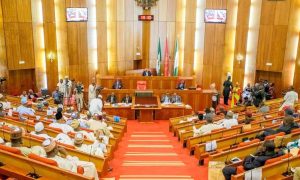This week, we examine the recently published Gross Domestic Product (GDP) data for Q1:2024 and share our views on the decision of the CBN to raise its benchmark interest rate by 150bps to record level of 26.25%.
To begin with, the Nigerian economy expanded by 2.98% y/y in real terms in Q1:2024, close to our base case projection of 2.93%, but trailed Q4:2023 print of 3.54%. The Q1 growth performance was supported in part by the sustained recovery in the oil economy which grew 5.7% as against a 4.2% contraction in Q1:2023, reflecting the modest improvement in average crude oil production to 1.57mbpd as against 1.51mbpd in the corresponding period of 2023. On the other hand, the non-oil economy grew 2.80% compared to 2.77% in Q1:2023, nonetheless underperformed Q4:2023 growth of 3.07%. In all, the share of the oil economy rose to 6.38% from 6.21% in Q1:2023, while the share of the non-oil economy compressed mildly by 16bps y/y to 93.62%.
From a structural viewpoint, the Services sector was dominant (up 4.3% y/y), with the Agriculture (up 0.2% y/y) and Industries (up 2.2% y/y) sectors offering support to the overall growth print. Specifically, the growth in the Services sector was buoyed by expansion in Finance & Insurance sector (up 31.2% y/y), reflecting the impressive Q1 outing of publicly listed financial institutions (stand-alone sector growth was 33.3% y/y). Meanwhile, the Information & Communications sector (17.5% of GDP) rose 5.4% y/y in real terms, although on a quarterly basis, growth declined 9.9% as telcos implement the mandatory NIN-SIM linkage which led to a contraction in subscriber base (down 2.3% to 219.2m in Q1:2024). Meanwhile, Trade expanded slightly by 1.2% in Q1:2024, though it fell 8bps y/y as businesses and households continue to deal with the impact of inflationary pressure (April’ 2024: 33.7%) and a volatile FX market (NGN down c.32.5% in Q1:2024) despite CBN interventions.
Meanwhile, Mining and Quarrying (6.5% share of GDP) grew by 6.3% y/y due to improvement in crude oil production (98.5% share of the sub-sector). Also, Transportation and Storage comprising Road (+5.6%), Rail & Pipelines (+66.6%), Water (+4.3%), Air (-9.5%), Transport Services (+5.9%), and Post and Courier Services (+2.4%) advanced 3.3% (FY’23, -30.2%). The Manufacturing sector (10.0% share of GDP) rose 1.5% y/y while the Construction sector (4.0% share of GDP) declined 2.1% y/y largely due to weak investment spending as exemplified with FG’s repeated underfunding of capital budget (actual CAPEX was 23.2% of budgeted as of 9M:2023).
Looking ahead, we maintain our conservative growth projection of 3.0% for the full year 2024. This cautious stance is informed by the lingering impacts of ongoing reforms on growth potentials, challenging business environment, protracted security concerns, exchange rate volatility, dwindling Agric sector growth (the minuscule growth in Q1 is the lowest since negative print of 0.9% in Q1:2023), and mounting risk in the external environment.
Elsewhere, the CBN at the end of its 295th meeting voted to raise the MPR by 150bps to 26.25% – third consecutive hike this year (YTD cumulative increase now 750bps), whilst retaining the asymmetric corridor of +100/-300 basis, CRR at 45.0%, and Liquidity Ratio at 30.0%. The decision to further tighten the policy rate was hinged on the move to sustain a contractionary stance in the face of staggering inflationary pressure (Apr:24, 33.7% y/y). Also, other key considerations to support this decision include muted policy stance of monetary authorities in key advanced markets despite moderation in inflationary levels, volatility in the FX market, and challenges around food production. The MPC argued that while headline inflation remained on the uptrend (up 0.49% m/m) the sub-components (food and core) declined m/m which suggests that its hawkish stance has begun to yield results.
However, we note that inflation has remained largely unresponsive to the CBN’s aggressive push (up 379bps since the turn of the year), on account of schism between fiscal and monetary authorities, effect of successive rate hikes on the real sector, and inefficiencies in policy transmission channels. Furthermore, we opine that it is highly improbable that raising the policy rates alone would be sufficient to address Nigeria’s inflation quagmire considering the triplicate relationship between interest rate, inflation rate, and exchange rate (down 33.5% YTD to ₦1,485.66/$1). We recommend the apex bank improves collaboration with the fiscal authority on the fight against inflation as isolated MPR hike would likely further devastate Nigeria’s fragile macroeconomic fundamentals.
Domestic Equities Market: Rate Hike Fuels Bearish Sentiment
Reacting to the latest 150bps tightening of the benchmark policy, the local bourse closed bearish in each of the last three trading sessions, culminating in a 0.5% w/w decline in the NGX-ASI to 97,612.51 points. Accordingly, market capitalisation shed 0.5% w/w to ₦55.2tn while YTD trimmed to 30.5% (previously 31.0%). Meanwhile, activity level varied as average volume rose 20.6% w/w to 398.4m units, while average value declined 4.6% w/w to ₦8.1bn. The top traded stocks by volume were ACCESSCORP (281.8m units), GTCO (117.8m units) and UBA (113.9m units), while ACCESSCORP (₦4.8bn), GTCO ((₦4.5bn) and ZENITH (₦2.7bn) led in terms of value.
Across our coverage sectors, performance was bullish, as four indices gained while two lost. Leading the train, the AFR-ICT and Oil & Gas indices advanced 1.0% and 0.7% w/w respectively, following gains in MTNN (+2.9%), OANDO (+1.4%) and SEPLAT (+1.3%). Trailing, the Consumer and Industrial Goods indices inched higher by 0.3% and 0.2% w/w respectively due to price uptick in MCNICHOL (+10.0%), NESTLE (+9.8%), BERGER (+20.6%) and CUTIX (+10.2%). Conversely, selloffs on UBA (-12.1%), FBNH (-10.9%), MBENEFIT (-10.3%) and NEM (-9.5%) dragged the Banking and Insurance indices down 7.3% and 3.5% w/w, respectively.
Investor sentiment, as determined by market breadth, weakened to -0.4x (previously 0.3x) as 24 stocks advanced, 51 lost and 76 remained unchanged. Top gainers for the week were BERGER (+20.6%), REGALINS (+19.4%) and CUTIX (+10.2%), while DEAPCAP (-24.5%), FTNCOCOA (-16.7%) and TRANSCORP (-12.1%) led the losers. Next week, we expect the bearish sentiment to persist owing to the currently pressured risk adjusted upside on equities assets.
Afrinvest



























